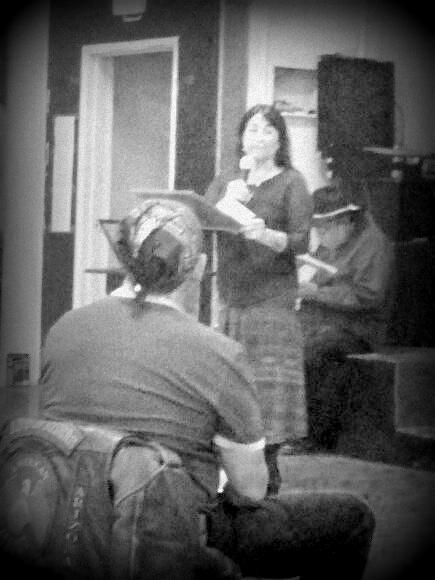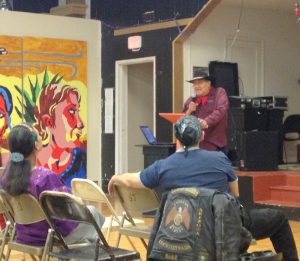 TUCSON – The Global Justice Center in Tucson was host to an annual recognition of United Nations Human Rights Day. Tucson is one of a handful of cities nationwide that traditionally celebrates the day, a city where several human rights organizations call home. The Alianza Indigena Sin Fronteras (Indigenous Alliance without Borders), The Alliance for Global Justice, Coalicion de Derechos Humanos (Human Rights Coalition), School of the Americas Watch, Occupy Tucson, and Unidos all organizations working for global human rights and justice, are housed in the Global Justice Center.
TUCSON – The Global Justice Center in Tucson was host to an annual recognition of United Nations Human Rights Day. Tucson is one of a handful of cities nationwide that traditionally celebrates the day, a city where several human rights organizations call home. The Alianza Indigena Sin Fronteras (Indigenous Alliance without Borders), The Alliance for Global Justice, Coalicion de Derechos Humanos (Human Rights Coalition), School of the Americas Watch, Occupy Tucson, and Unidos all organizations working for global human rights and justice, are housed in the Global Justice Center.
First adopted on December 10, 1948 by the United Nations General Assembly (UN), the Universal Declaration of Human Rights was eventually signed by 48 member states including the United States. Other signers included nations that went on to experience internal conflicts that resulted in gross human rights violations including Bolivia, Chile, Colombia, El Salvador, Guatemala, Haiti, Mexico, Paraguay, Peru, Philippines, Syria, the United States, and in India that very year. Though not binding, the Declaration was developed by global actors including Eleanor Roosevelt, politician, diplomat, and wife of President Franklin D. Roosevelt.
Tucson has been the location of Human Rights Day regularly and this year, Alianza Indigena Sin Fronteras organized speakers including Andrea Carmen, director of the International Indian Treaty Council and director of Alianza, Jose Matus.
Carmen talked about Article 31 of the Declaration which protects the right of Indigenous Peoples to control and protect cultural heritage.
“We are up for the fight of our lives here in the next four years.”
She talked about the Council’s solidarity with the Standing Rock Sioux not only as a function of the nature of the fight, but because the International Treaty Council was founded in June 1974 on the Standing Rock Reservation and what followed.
“The elders invited us to sit at the table of the United Nations and told us to find other Indigenous peoples to figure out what to do. I was always told that it was hard to go to the United Nations and stay Indian. Now it’s economic order with the fossil fuel economy to defend our sacred waters and our traditional foods.”
“There were no Indigenous Peoples in the room when this [Declaration] was being adopted. I came back here after first going to the UN in the 1980s and discovered we didn’t have the literal translation for the term ‘human rights’ except ‘the peoples duty to the creator.’ That’s probably the closest we can come. Also as Indigenous peoples, not only do we talk about responsibilities instead of rights, we also don’t separate humans from the rest of the created world, so the best translation might be, ‘natural world responsibilities.'”
“No declaration, no treaty, no constitution, no law, no convention gives rights or takes them away. Our rights are ours because the Creator put us here on our land. Rights can be violated, or rights can be honored or respected and upheld. They can’t be given or taken away, you cannot even give up your rights.”
After 1974, Carmen appeared at the UN several times working up to the adoption of the UN Declaration on the Rights of Indigenous Peoples, “We kept bringing up to the countries over the 30 years that it took to get our declaration adopted at the United Nations. We had to get the countries to agree on the UN Declaration on the Rights of Indigenous Peoples.”
In that process Carmen said that the resistance from negotiators was the misconception that Indigenous rights were additional rights or could cause divisions, but Carmen said that she pushed back, “You were the ones who said that recognition of rights is the foundation of peace, violations of rights is what causes conflict.”
All the countries didn’t understand why it had to be that way for us and that’s part of why it took 30 years. Land, language, food sovereignty, cultures, ceremonies, those aren’t individual, those are collective. We can only do those as people. Not only are they collective, they’re generational, so we had a different concept.”
“If there’s anything to remember about human rights, remember that no one can take them away.”
